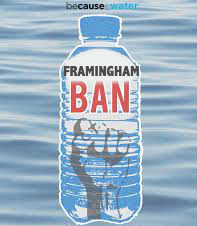 While most high school seniors are currently focusing on filling out college applications and getting their last sports seasons in before graduation, Framingham student Matt D’Amico is fitting a much larger fight into his busy schedule: banning bottled water.
While most high school seniors are currently focusing on filling out college applications and getting their last sports seasons in before graduation, Framingham student Matt D’Amico is fitting a much larger fight into his busy schedule: banning bottled water.
“Seeing what we put into our bodies and how it’s affecting us has always been very interesting for me,” D’Amico said in an interview on Thursday. He felt it was his duty to find a solution, any solution, to see less people suffer from ill health caused by a lack of environmental safety.
“[Eradicating bottled water] was one thing that we could do that wouldn’t really hurt business or consumers so much. It’s really a redundancy that we have considering tap water exists. It’s one of the easiest things to start with”, D’Amico explained.
The Proper Fight
With the negative health effects of ingesting PET (polyethylene terephthalate), the chemical used to make single-serving, single-use plastic water bottles, combined with the immense pollution caused by these bottles, this felt like the proper fight for D’Amico to take on. “The two biggest issues for me are climate change and environmental safety. These bottles simply use up a lot of our natural resources — water, oil — but also destroy the environment in the process.”
D’Amico breaks down the argument against bottled water into three main sections: environmental, health and economic. From an environmental standpoint, he said, the amount of natural resources used in making single-use plastic bottles is astounding. Filling our landfills, rivers and forests with these bottles is causing an environmental safety hazard, one that not only harms the natural world itself, but the humans that reside within it. The negative health effects of PET offer a strong argument on the health side, while the insane economic cost of purchasing these bottles for mere convenience (instead of using free tap water) is also powerful.
The Right Audience
Once D’Amico has a chance to explain his reasoning, most Framingham residents he has spoken with are easily on board with the bottled water ban. “After hearing the arguments,” D’Amico says, “most people agree with it. It’s just getting the word out there and speaking directly to those committee members that will make a difference.”
If successful, the bottled water ban would go into effect in January of 2016, giving businesses plenty of time to rid their shelves of bottled H2O. Luckily, Framingham has a fairly strong water infrastructure to adapt to these changes. Public fountains are fairly abundant in the town. This will also provide the town incentive to invest in more Water Bottle Filling Stations.
The Next Steps
In order to pass the bill, the next few weeks will be packed with meetings, solid debates and a plethora of persuasive emails for the high school senior and his small team. The deciding town meeting vote will occur on October 21st. A simple majority is needed to pass the bill and would make Framingham the second town in Massachusetts to pass a bottled water ban. Concord, MA passed a similar bill in April of 2012.
“I think there’s a good chance this is going to happen,” D’Amico optimistically stated.
Matt mentioned that anyone looking to get involved can email him at framinghamgreeninitiative@gmail.com.
Vote for Matt’s cause to install bottle filling stations in Framingham HERE.


